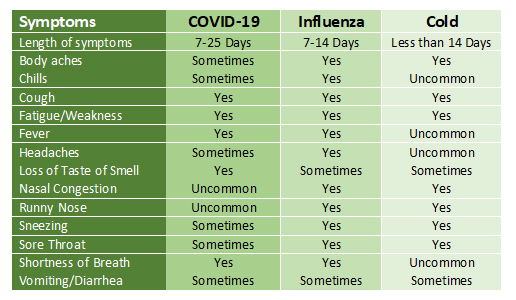Flu, Cold, and COVID-19: How to tell the difference
When symptoms of seasonal illness set in, it won’t always be clear which infection you’re dealing with. Because it will be difficult to tell them apart, contact your provider to determine what care you may need, including testing.
- COVID-19 is a highly contagious respiratory illness. COVID-19 can have varying degrees of symptoms, from none to severe. Symptoms may include fever or chills, severe cough, sore throat and the loss of taste or smell. COVID-19 can cause medical complications, especially in higher-risk groups, and can result in hospitalization and death. If you think you’ve been exposed to COVID-19 or are experiencing symptoms, learn more about options for screening and receiving care.
- The flu is a contagious respiratory illness that can cause mild to severe illness, with symptoms such as fever, cough and body aches. Most people with the flu don’t need medical care or medication. However, the flu can be very serious and require medical attention. Contact your doctor if your symptoms worsen, are prolonged, or if you’re at high risk of flu-related complications. Testing may be necessary to confirm a diagnosis.
- With a cold, you may feel pretty crummy, but the symptoms (e.g., cough, sore throat, fatigue, etc.) are mild in comparison to viruses like the flu and COVID-19. Rest and many over-the-counter medications can help relieve symptoms.
Still unsure? Check your symptoms against this chart.

With the cold, flu and COVID-19 circulating in our communities, it’s more important than ever to stay healthy. The flu shot and COVID-19 vaccine is your best defense against serious illness and reduces the risk of spreading contagious diseases to friends, family and your community. And, it’s safe to get both the flu and COVID vaccine at the same time. Learn more about COVID-19 and flu shots.


